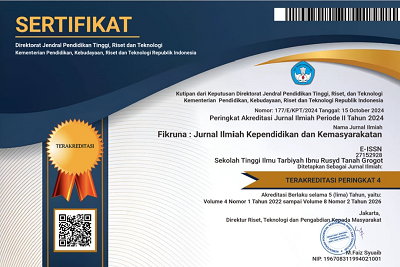IMPLEMENTASI KEPEMIMPINAN SPIRITUAL PENDIDIKAN BERBASIS MASYARAKAT
Abstract
Spiritual leadership is a form of leadership style that emphasizes on the way to get the pleasure of God. This studys objective is to describe the implementation of spiritual leadership in a form of society-based education called majelis talim. The research method is qualitative with case study approach. Collecting observation data, document study, and interview with participant analyzed by data reduction process, data presentation, and drawing conclusions. The result shows that (1) Spiritual leadership that emphasize on ruhiyyah morality and call of conscinesness has ability to set actual leadership style. Exemplary behaviour exemplified by a leader such as deepening knowledge about divinity and put into practice enable to form strong beliefs (yaqin). (2) among the characteristic of leader that has spiritual leadership is the set of capacity to prioritizing cleanliness of heart, protecting oneself from dishonorable actions (wara), and refrain from the dazzling temptations of the world (zuhud). (3) leaders skills in communicating spiritual values such as yaqin, wara, and zuhud has ability to grows collective consciousness in member of majelis talim.
References
Abdussamad, Z. (2021). Metode Penelitian Kualitatif. Makassar: Syakir Media Press.
Al-Ghaz?l?. (n.d.). Ihya" Ulumuddin (II). Beirut: Dar Kutub al-Ilmiyah, t.t.
Amram, Y., & Dryer, D. C. (2008). The Integrated Spiritual Intelligence Scale (ISIS): Development and Preliminary Validation. 116th Annual Conference of the American Psychological Association, 49, 69�73. https://www.bertelsmann-stiftung.de/fileadmin/files/BSt/Publikationen/GrauePublikationen/MT_Globalization_Report_2018.pdf%0Ahttp://eprints.lse.ac.uk/43447/1/India_globalisation, society and inequalities(lsero).pdf%0Ahttps://www.quora.com/What-is-the
Asy�ari, A. H. (2021). Wara� dalam Ajaran Tasawuf Imam Junaid Al-Baghdadi. Jurnal Penelitian Ilmu Ushuluddin, 1(3), 209�223. https://doi.org/10.15575/jpiu.12845
Bahreisj, H. (1981). Ajaran-ajaran akhlak Imam Ghazali.
Hogan, R., & Kaiser, R. B. (2005). What we know about leadership. Review of General Psychology, 9(2), 169�180. https://doi.org/10.1037/1089-2680.9.2.169
Khairrurraziqin, Dewi Purnama Sari, F. (2020). KONSEP PENDIDIKAN ANDRAGOGI DALAM PERSPEKTIF PENDIDIKAN ISLAM. JOEAI (Journal of Education and Instruction), 3(Desember), 1�9. https://doi.org/https://doi.org/10.31539/joeai.v3i2.1399
Khumalo, F. T. E. (1999). Methods of assessing learning needs for community education programmes.
Murni. (2014). The Concept of Ma�rifatullah According to Al-Ghazali (A Study on the Implementation of Al-Karimah�s Values of Virtue). Ar-Raniry: International Journal of Islamic Studies, 2(1), 123�146.
Nuraini, A., & Alimir. (2020). Animo Masyarakat Dalam Mengikuti Kegiatan Majelis Ta�lim Di Nagari Talunan Maju Kecamatan Sangir Balai Janggo Kabupaten Solok Selatan. 2, 113�123.
https://doi.org/https://doi.org/10.31004/anthor.v1i1.8
Percy, I. (2003). Going Deep: Exploring Spirituality in Life and Leadershi. Medicine Bear Publishing, 1999.
Ridwan, I., & Ulwiyah, I. (2020). Sejarah Dan Kontribusi Majlis Ta�Lim Dalam Peningkatan Kualitas Pendidikan Di Indonesia. Jurnal Pendidikan Karakter �JAWARA� (JPKJ), 6(1), 17�42.
http://jurnal.untirta.ac.id/index.php/JAWARA/article/view/8299
Rivai, V., & Mulyadi, D. (2013). Kepemimpinan dan perilaku organisasi (Ed. 3, cet). Jakarta?: Raja Grafindo Persada, 2012.
Sarnoto, A. Z., & Sholihin, A. (2017). Perilaku Kepemimpinan Berbasis Spiritual Dalam Pengembangan Lembaga Pendidikan Islam. Jurnal Statement?: Media Informasi Sosial Dan Pendidikan, 7(2), 56�64. https://doi.org/10.56745/js.v7i2.203
Sazly, S., & Ardiani, Y. (2019). Pengaruh Kepemimpinan Transformasional terhadap Kinerja Pegawai pada Kantor Kecamatan Cengkareng Jakarta Barat. Perspektif, 17(2), 184�194.
Sugiyono. (2018). Metode penelitian kuantitatif (C. 1 (ed.)). Bandung?: Alfabeta, 2018.
Syahri, A. (2019). Spiritual Leadership. In Journal of Healthcare Management and Leadership (Issue 1). https://doi.org/10.35345/johmal.529712
Terry Robert. (2002). Kepemimpinan autentik keberanian untuk bertindak.
Zuhri, Z. (2019). Majelis Ta�lim sebagai Model Pendidikan Non Formal Islam. AL-USWAH: Jurnal Riset Dan Kajian Pendidikan Agama Islam, 2(1), 23. https://doi.org/10.24014/au.v2i1.6740
Copyright (c) 2025 Rusmiati Indrayani

This work is licensed under a Creative Commons Attribution-NonCommercial 4.0 International License.



.png)












